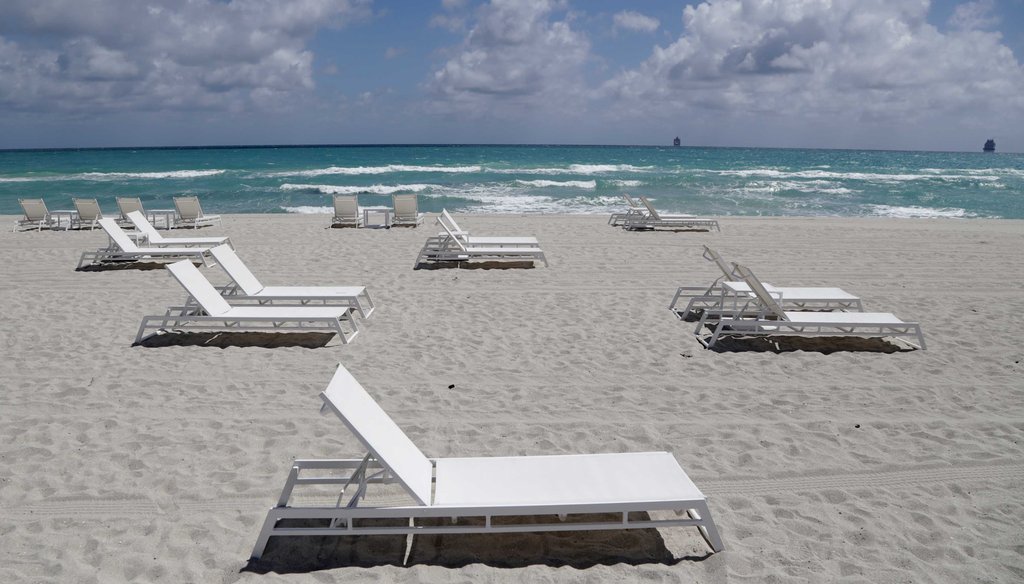Stand up for the facts!
Our only agenda is to publish the truth so you can be an informed participant in democracy.
We need your help.
I would like to contribute

Empty chairs sit on the beach on March 19, 2020, in Miami Beach, Fla. (AP)
During the day-to-day coverage of the coronavirus pandemic, it can sometimes feel like there are more questions than answers.
So in this edition of Ask PolitiFact, we answered more of our readers’ questions about the virus. We read the latest research on how long the coronavirus can live on different surfaces and consulted with experts about whether people should really avoid ibuprofen for treating COVID-19 symptoms. To submit your own question for a future story, fill out this form.
For more reporting on coronavirus seasonality, immunity and transmission, check out this story.
For information about government action on the coronavirus, read this one, too.
Knowing the facts has never been more important. Please consider donating to PolitiFact today.
Sign up for PolitiFact texts
Preliminary research suggests that it depends on the type of surface, but it can be as long as a few days.
In an article published in the New England Journal of Medicine on March 17, researchers tested how long the coronavirus, formally called SARS-CoV-2, lived on five different surfaces: aerosols, plastic, stainless steel, copper and cardboard.
"SARS-CoV-2 remained viable in aerosols throughout the duration of our experiment (3 hours)," the authors wrote. "SARS-CoV-2 was more stable on plastic and stainless steel than on copper and cardboard."
Aside from air, the worst surface for the virus is copper; researchers could only detect viable virus particles there for up to four hours. On cardboard, they could not detect any after 24 hours. The coronavirus lives the longest on plastic and stainless steel — up to three days.
It’s worth noting that the article is not a peer-reviewed study, and researchers tested the lifespan of SARS-CoV-2 in a lab setting. But their findings reflect what others have found about the potential longevity of the coronavirus outside the body. Read more in this fact-check.
It depends on what the money is made of.
The Journal of Hospital Infection article says human coronaviruses could live on paper for anywhere between one to five days. The U.S. Dollar is made up of 75% cotton and 25% linen, as opposed to wood pulp, which is the base for most paper.
Still, you’re probably safer handling coins. The New England Journal of Medicine article found that COVID-19 can only survive for up to four hours on copper, which is what quarters, nickels and dimes are primarily made of. Ironically, pennies are made primarily of zinc, although they have a copper exterior.
The World Health Organization advises people to wash their hands with soap and water after handling banknotes, coins and credit cards. If you’re feeling paranoid, you could disinfect coins using cleaners that contain at least 60% alcohol, or products from companies like Lysol and Clorox that have proven effective against other human coronaviruses. Apply less cleaner to bills, which are likely to tear when wet.
As of now, there is no specific treatment for people infected with COVID-19. But there are some things they can do to alleviate their symptoms while in self-quarantine.
The coronavirus is a virus, meaning antibiotics don’t work against the infection. There also aren’t currently any antiviral medications recommended to treat COVID-19, although President Donald Trump has said the Food and Drug Administration is fast-tracking potential treatments.
RELATED: Stop sharing myths about preventing the coronavirus. Here are 4 real ways to protect yourself
According to the Mayo Clinic, there are still a few things patients with the coronavirus can do to alleviate symptoms, which include cough, shortness of breath and fever. Cough medicine, pain and fever relievers, rest, and fluids are all recommended.
In the U.S., not as of now. But it’s complicated.
French doctors recently cast doubt on using ibuprofen, a fever and pain reliever, to treat the coronavirus. Some experts believe ibuprofen’s anti-inflammatory properties could dampen the immune system’s response to fighting off COVID-19.
But professionals also say this is just a theory and that there’s no scientific evidence that links ibuprofen and other anti-inflammatory medications with COVID-19 complications. American health officials have found no evidence that the over-the-counter drug is not safe for COVID-19 patients to use.
Still, England's National Health Service is one of the organizations that is recommending people err on the side of caution.
"Until we have more info, take paracetamol to treat the symptoms of coronavirus, unless your doctor has told you paracetamol is not suitable for you," NHS wrote March 18. Paracetamol is also known as acetaminophen.
There is not enough credible information to say for sure whether ibuprofen can negatively impact patients with coronavirus. Right now, people should remain skeptical about sweeping statements that make bold claims about ibuprofen and the virus (like the one that inspired this fact-check).
It depends on how crowded they are.
Public health officials have advised Americans to practice "social distancing," or avoiding crowded public spaces. The White House has advised Americans to avoid gatherings of 10 or more people. In some places, groups that large are banned.
While there is no guidance from public health officials on beaches, you’re probably safe as long as you keep your distance from other people and practice good personal hygiene. But many beaches are closing to avoid creating crowds.
After national news outlets broadcasted footage showing throngs of spring breakers on the beach in Clearwater, Fla., local officials voted to close all county beaches. Officials in Miami, Fort Myers and other vacation destinations in Florida, as well as neighboring Alabama and Georgia, have decided to do the same.
The problem isn’t necessarily the beaches themselves — it’s the overcrowding. Even in places with mandatory shelter in place orders, such as California, people can still go outside and get some fresh air.
So if your local beach is open, just make sure to stay the recommended distance of at least six feet away from others. Wash your hands regularly and avoid touching your face to prevent the transmission of germs.
Our Sources
See fact-checks.

































